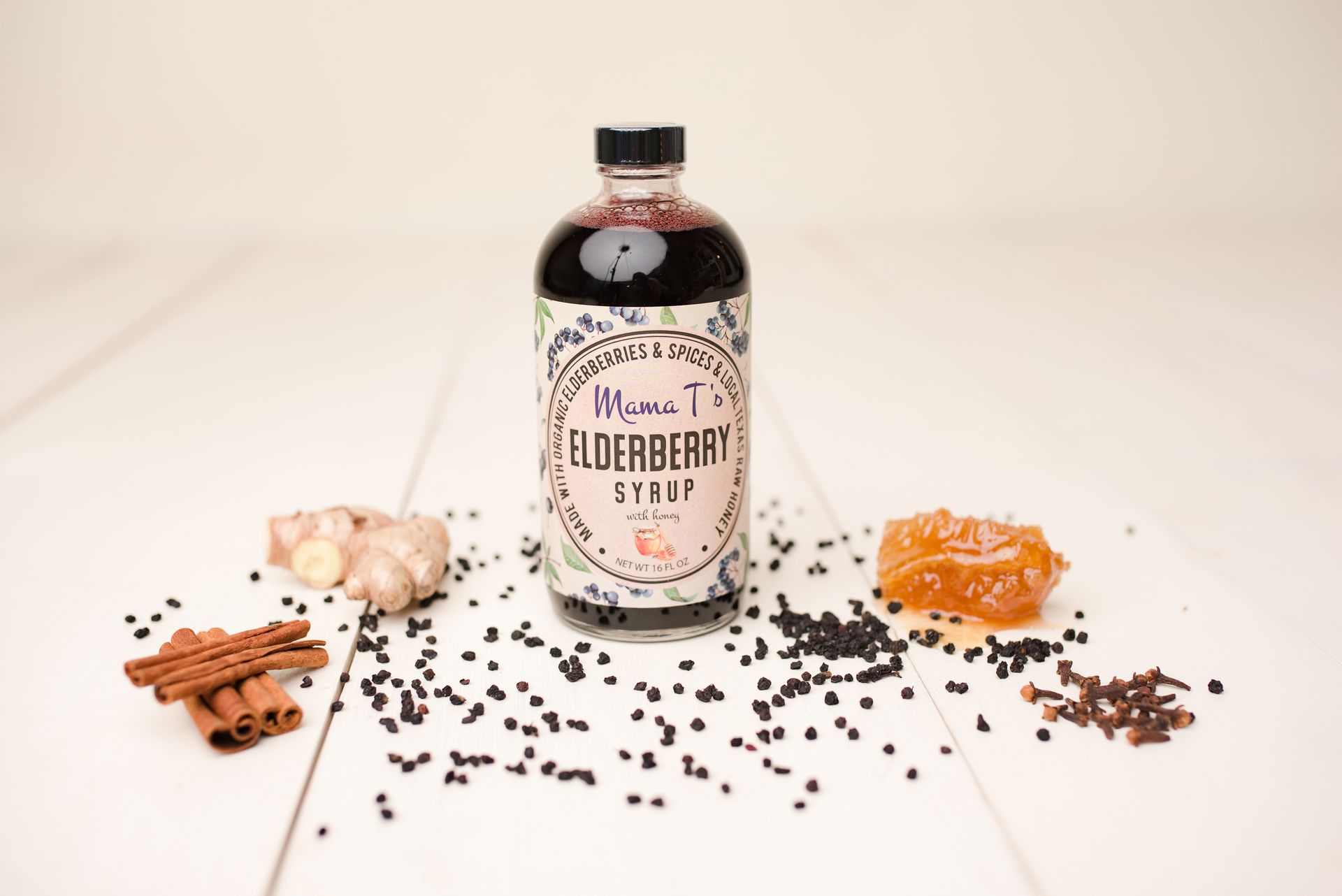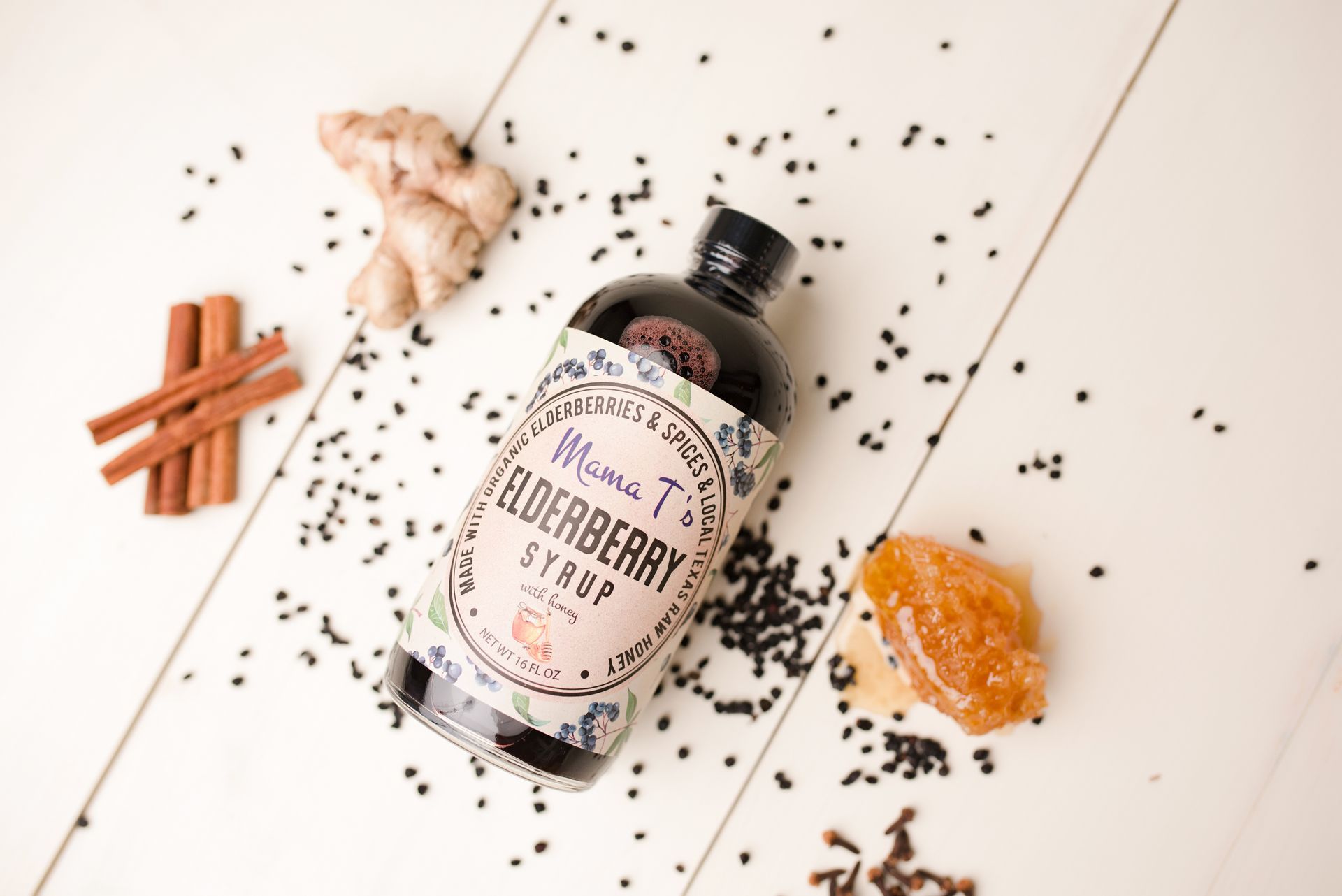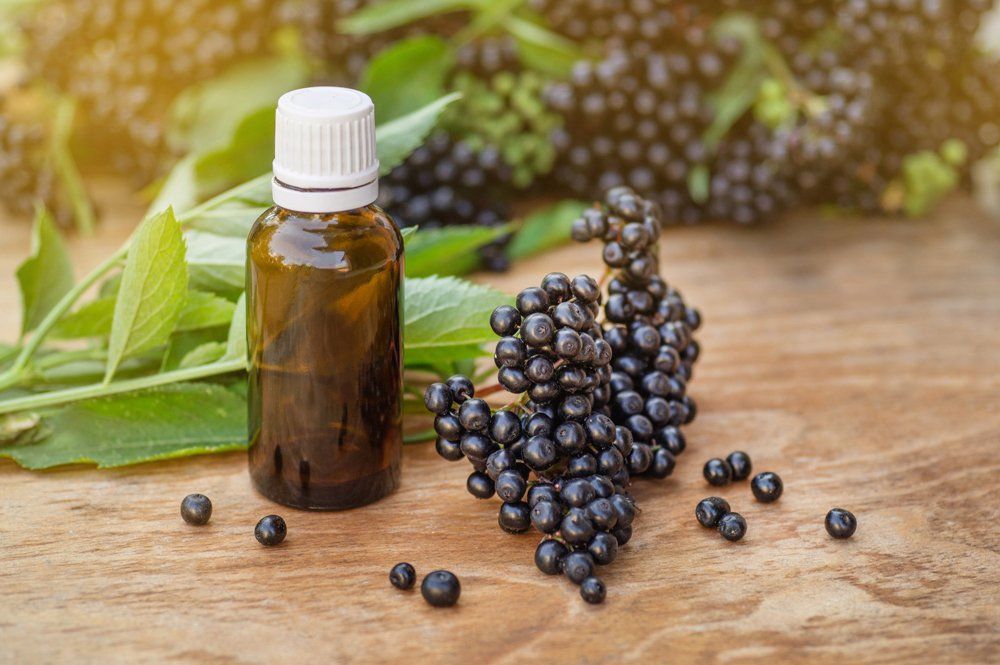Elderberry Syrup
Health Benefits of Elderberry
There are many reported benefits of elderberries. Not only are they nutritious, but they may also fight cold and flu symptoms, support heart health and fight inflammation and infections, among other benefits.
High in Nutrients
Elderberries
are a low-calorie food packed with antioxidants.
Plus, they have many nutritional benefits. Elderberries are:
- High in vitamin C: There are 6–35 mg of vitamin C per 100 grams of fruit, which accounts for up to 60% of the recommended daily intake (3, 4).
- High in dietary fiber: Elderberries contain 7 grams of fiber per 100 grams of fresh berries, which is over one-quarter of the recommended daily intake (4).
- A good source of phenolic acids: These compounds are powerful antioxidants that can help reduce damage from oxidative stress in the body (4, 5).
- A good source of flavonols: Elderberry contains the antioxidant flavonols quercetin, kaempferol and isorhamnetin. The flowers contain up to 10 times more flavonols than the berries (4).
- Rich in anthocyanins: These compounds give the fruit its characteristic dark black-purple color and are a strong antioxidant with anti-inflammatory effects (4, 6).
The exact nutritional composition of elderberries depends on the variety of plants, ripeness of the berries and environmental and climatic conditions. Therefore, servings can vary in their nutrition (4, 7).
SUMMARY Elderberries are a low-calorie food packed with vitamin C, dietary fiber and antioxidants in the form of phenolic acids, flavonols and anthocyanins. The flowers are particularly rich in flavonols.
May Improve Cold and Flu Symptoms
Black elderberry extracts and flower infusions have been shown to reduce the severity and length of influenza (8).
Commercial preparations of elderberry for the treatment of colds come in various forms, including liquids, capsules, lozenges, and gummies.
One study of 60 people with influenza found that those who took 15 ml of elderberry syrup four times per day showed symptom improvement in two to four days, while the control group took seven to eight days to improve (9).
Another study of 64 people found that taking 175-mg elderberry extract lozenges for two days resulted in significant improvement in flu symptoms, including fever, headache, muscle aches, and nasal congestion, after just 24 hours (10).
Furthermore, a study of 312 air travelers taking capsules containing 300 mg of elderberry extract three times per day found that those who got sick experienced a shorter duration of illness and less severe symptoms (11).
Further large-scale studies are required to confirm these results and determine if elderberry may also play a role in preventing influenza (8).
Note that the majority of research has only been performed on commercial products, and there is little information about the safety or efficacy of homemade remedies (8).
SUMMARY Elderberry extract has been found to reduce the length and severity of symptoms caused by the influenza virus. While these results are promising, further large-scale human studies are needed.
High in Antioxidants
During normal metabolism, reactive molecules may be released that can accumulate in the body. This can cause oxidative stress and lead to the development of diseases like type 2 diabetes and cancer (12, 13, 14).
Antioxidants are natural components of foods, including some vitamins, phenolic acids, and flavonoids, that are able to remove these reactive molecules. Research suggests that diets high in antioxidants may help prevent chronic disease (5, 12, 15).
The flowers, fruits, and leaves of the elderberry plant are excellent sources of antioxidants. For example, anthocyanins found in the berries have 3.5 times the antioxidant power of vitamin E (4, 15, 16, 17).
One study comparing 15 different varieties of berries and another study comparing types of wine found that elderberry is one of the most effective antioxidants (18, 19).
Additionally, one study found that antioxidant status improved in people one hour after drinking 400 ml of elderberry juice. Another study in rats found that elderberry extract helped reduce inflammation and oxidative tissue damage (20, 21).
While elderberry has shown promising results in the lab, research in humans and animals is still limited. Generally, consuming it in the diet has only a small effect on antioxidant status (17).
In addition, the processing of elderberries, such as extraction, heating or juicing, can reduce their antioxidant activity (4).
Therefore, products like syrups, juices, teas, and jams may have reduced benefits compared to some results seen in laboratory studies (16).
SUMMARYElderberry fruits, leaves and flowers are strong antioxidants. However, their protective effects in humans appear to be weak. Additionally, the processing of the berries and flowers can reduce their antioxidant activity.
May Be Good for Heart Health
Elderberry may have positive effects on some markers of heart and blood vessel health.
Studies have shown elderberry juice may reduce the level of fat in the blood and decrease cholesterol. In addition, a diet high in flavonoids like anthocyanins has been found to reduce the risk of heart disease (17, 22).
Nonetheless, one study in 34 people given 400 mg of elderberry extract (equivalent to 4 ml of juice) three times a day for two weeks found no significant reduction in cholesterol levels (23).
However, another study in mice with high cholesterol found that a diet including black elderberry reduced the amount of cholesterol in the liver and aorta but not the blood (24).
Further studies found that rats fed with foods containing polyphenols extracted from elderberry had reductions in blood pressure and were less susceptible to organ damage caused by high blood pressure (25, 26).
Furthermore, elderberries may reduce levels of uric acid in the blood. Elevated uric acid is linked to increased blood pressure and negative effects on heart health (4, 27).
What’s more, elderberry can increase insulin secretion and improve blood sugar levels. Given that type 2 diabetes is a major risk factor for heart and vascular disease, blood sugar control is important in preventing these conditions (4, 8).
A study found that elderberry flowers inhibit the enzyme α-glucosidase, which may help lower blood sugar levels. Also, research on diabetic rats given elderberry showed improved blood sugar control (4, 15, 28).
Despite these promising results, a direct reduction in heart attacks or other symptoms of heart disease has not yet been demonstrated, and further studies in humans are needed.
Other Health Benefits of Elderberry Syrup
There are many other reported benefits of elderberry, though most of these have limited scientific evidence:
- Helps fight cancer: Both European and American elders have been found to have some cancer-inhibiting properties in test-tube studies (5, 8, 29).
- Fights harmful bacteria: Elderberry has been found to inhibit the growth of bacteria like Helicobacter pylori and may improve symptoms of sinusitis and bronchitis (8).
- May support the immune system: In rats, elderberry polyphenols were found to support immune defense by increasing the number of white blood cells (30).
- Could protect against UV radiation: A skin product containing elderberry extract was found to have a sun protection factor (SPF) of 9.88 (31).
- May increase urination: Elderberry flowers were found to increase the frequency of urination and the amount of salt excretion in rats (32).
- May have some antidepressant properties: One study found mice fed 544 mg of elderberry extract per pound (1,200 mg per kg) had improved performance and mood markers (33).
While these results are interesting, further research is needed in humans to determine if the effects are truly significant.
Moreover, it’s important to note that there is no standardized method for measuring the number of bioactive components like anthocyanins in these commercial products.
One study showed that depending on the method used to measure anthocyanins, a supplement could claim to contain 762 mg/L but really only contain 4 mg/L. Therefore, determining the effects of currently available products may be difficult (17).
SUMMARY Elderberry is associated with many additional health benefits, such as fighting cancer and bacteria, immune support, UV protection, and diuretic effects. However, these claims have limited evidence, and further research is needed.
Health Risks and Side Effects
While elderberry has some promising potential benefits, there are also some dangers associated with its consumption.
The bark, unripe berries and seeds contain small amounts of substances known as lectins, which can cause stomach problems if too much is eaten (2).
In addition, the elderberry plant contains substances called cyanogenic glycosides, which can release cyanide in some circumstances. This is a toxin also found in apricot seeds and almonds (1, 34).
There is 3 mg of cyanide per 100 grams of fresh berries and 3–17 mg per 100 grams of fresh leaves. This is just 3% of the estimated fatal dose for a 130-pound (60-kg) person (2, 35).
However, commercial preparations and cooked berries do not contain cyanide, so there are no reports of fatalities from eating these. Symptoms of eating uncooked berries, leaves, bark or roots of the elderberry include nausea, vomiting, and diarrhea (2).
There is one report of eight people falling ill after drinking the juice from freshly picked berries, including the leaves and branches, from the S. Mexicana elder variety. They experienced nausea, vomiting, weakness, dizziness, numbness, and stupor (36).
Luckily, toxic substances found in the berries can be safely removed by cooking. However, the branches, bark or leaves should not be used in cooking or juicing (2).
If you are collecting the flowers or berries yourself, ensure that you have correctly identified the plant as American or European elderberry, as other types of elderberry may be more toxic. Also, be sure to remove any bark or leaves before use.
Elderberry is not recommended for children and adolescents below 18 years of age or pregnant or lactating women. While no adverse events have been reported in these groups, there is not enough data to confirm that it is safe (2).
SUMMARY The uncooked berries, leaves, bark, and roots of the elderberry plant contain the chemicals lectin and cyanide, which can cause nausea, vomiting, and diarrhea. Cooking the berries and seeds will remove the cyanide.








